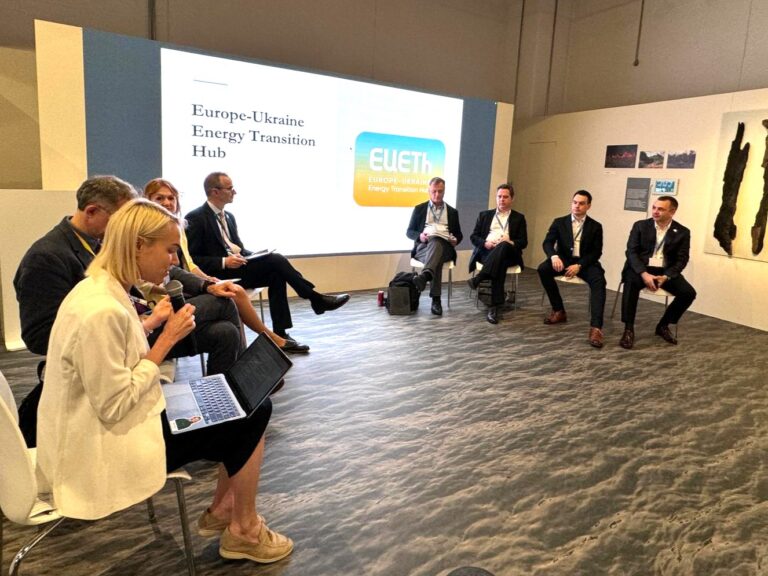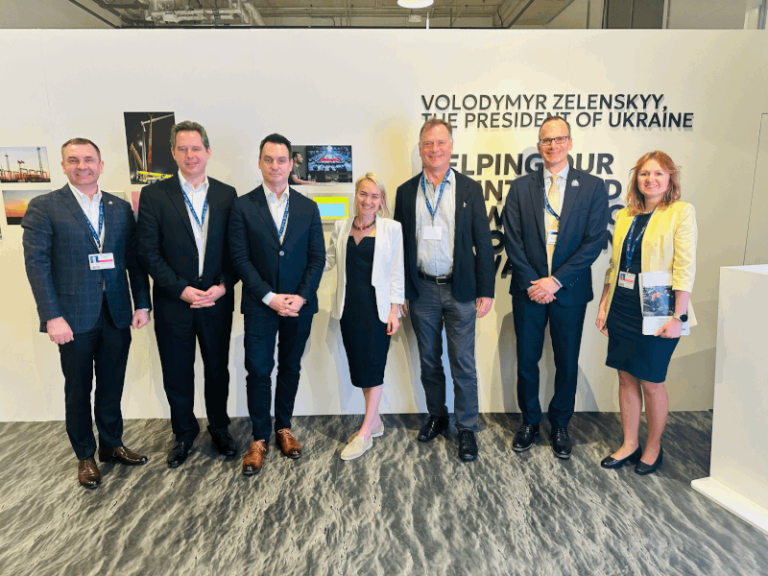Ievgeniia Kopytsia, research associate at IKEM and member of the newly founded Europe Ukraine Energy Transition Hub (EUETH), attended COP28 in Dubai. In an interview, she shares insights on the conference and its outcomes, along with their implications for Ukraine.
What was your role at COP28 in Dubai?
I attended the COP in a dual role as a representative of IKEM and a member of the Ukrainian delegation. I actively participated in official governmental events and panel discussions dedicated to the environmental consequences and climate impact of the war in Ukraine, as well as the country’s green reconstruction efforts – including the side event of our Europe Ukraine Energy Transition Hub at the Ukrainian pavilion.
What was the atmosphere like on the ground?
Despite the controversy and scepticism preceding COP28 in Dubai, there was a palpable sense of optimism, especially when the launch of the Loss and Damage Fund was announced on the first day. The uplifting and celebratory atmosphere made me feel like a witness to an epic historic moment.
As the COP continued, optimism became a little blurry. Even if you were not in the room with negotiators, you could feel the atmosphere shift. OPEC was urging the rejection of any text targeting fossil fuels rather than emissions, while climate activists were growing more assertive and demanding.
COP28 discussed the First Global Stocktake, which found that the world is not on track to achieve the goals set out in the Paris Agreement. What measures did the negotiators agree on?
What other outcomes did COP28 provide?
What’s your take on the results?
The final agreement text of COP28 contains several key climate milestones, such as the imperative of limiting global warming to 1.5°C, the ambitious goal of tripling global renewable energy capacity by 2030, and a call for a transition away from fossil fuels to achieve net-zero emissions by 2050. From my perspective, this appears comprehensive and promising. One could even call it a historic moment. However, there have been too many historic moments in climate negotiations. Citing COP28 President Al Jaber, ‘An agreement is only as good as its implementation.’ Words must now be transformed into action. And to me, this means translating words into laws.
Technically, COP28 concluded with a significant number of loopholes and unaddressed issues. Notably, the first global Stocktake falls short, lacking the complete set of actions needed to close the emission and adaptation gaps. The Loss and Damage Fund, initially supported by $700 million in funding commitments, is just the beginning; a minimum of $100 billion will be required, increasing to $300 billion annually by 2030. Additionally, a widely anticipated deal on carbon trading mechanisms, intended to endorse standards for the carbon credit market and establish key rules for approving offset projects in a centralized United Nations-run system, failed to materialize.
What consequences do the results of COP28 have for Ukraine?
Ukraine is deeply committed to achieving net zero but faces economic constraints and vulnerability to fossil fuel market fluctuations. The omission of an explicit commitment to phase out or reduce fossil fuels in the COP28 agreement is, therefore, a concern for Ukraine.
The UNFCCC regime also lacks a mechanism to address the challenges faced by war-affected countries. A significant yet often overlooked issue is the lack of accountability for the aggressor regarding climate and environmental damages. According to Ukraine’s Ministry of Environmental Protection and Natural Resources, since the onset of the full-scale Russian invasion, at least 150 million tonnes of CO2eq directly related to the armed aggression have been released into the atmosphere. Additionally, there is a projected release of 50 million CO2eq tonnes due to the reconstruction of damaged infrastructure and residential buildings. The environmental damages caused by these war-induced CO2 emissions amount to $10 billion, potentially constituting a breach of the global climate commitment.
What are the lessons for COP29 in Azerbaijan?
The unresolved conflict with the OPEC states underlines that, in order to successfully reach agreements, negotiators will need to follow a strategic and nuanced approach that considers geopolitical implications, especially for oil-dependent economies. Balancing the transition away from fossil fuels with geopolitical stability and addressing broader consequences should be central to discussions and decisions at COP29.
How does IKEM contribute to the COP?
As a recognised NGO at the United Nations, IKEM has been actively engaged in COPs for many years. Typically, we have a small delegation on-site and organise a side event focused on one of our current research priorities – this year, it was the reconstruction and transformation of the Ukrainian energy sector. Additionally, we participate in briefings and side events, engaging with international experts and presenting our proposals for ambitious climate action.






